
Hello Archinect!
We’re just over half way through our pre-semester horse and pony show at the GSD. It’s a long haul. On Wednesday we had international student orientation, on Thursday was a general orientation, on Friday we had more presentations and facility tours, and these will continue on Monday and Tuesday, along with the studio and course presentations and lottery—which promise to be exciting, even though we lowly first-years can only “look but not touch.” Before I start, I also have to apologize to my classmates for being so grumbly on Thursday and Friday—I need to get more sleep and/or (probably “or”) just deal with it better.
Here are a few highlights from Thursday.
Mohsen Mostafavi, our dean, spoke first. Predictably enough, he emphasized the breadth of the GSD’s offerings, which he divided into studio-based (e.g. M.Arch., MLA and MAUD) programs, non-studio based (e.g. DDesS, PhD) programs, and other initiatives (executive education, exhibitions, other programs) that reach out to a wider audience. He also talked about transdisciplinary nature of the GSD, which includes Architecture, Landscape Architecture, and Urban Planning + Design.
Then for the pep talk: we heard how we are here not just for “skill-building,” or “to learn about how things have been done in the past,” although he acknowledged that both are essential, but that our goal as GSD students is ultimately “the advancement of the discipline” and to engage the speculative aspect of practice. In a more philosophical moment, he also talked about the use of technology in terms of investigating the “mediated imagination,” or in the means through which we make our ideas come about. And he mentioned sustainability as an area in which we (as a profession and as a school) have no choice but to be leaders.
A couple of fun initiatives that Dean Mostafavi mentioned. First: a publication called “View” that includes one page of work from any person at the GSD (faculty or student) who wants to contribute. And second: a series of “occasional lunchtime discussions” that he will lead, most often with people who are not architects but who deal with issues surrounding art and architecture. I’m glad that he isn’t shy about embracing fields peripheral to the discipline, as I think this can keep things interesting and add intellectual rigor.
We then broke into our departmental groups, and we heard from Preston Scott Cohen, the chair of architecture. He immediately drew a contrast with Dean Mostafavi’s emphasis on breadth and interdisciplinarity by saying that our department is “unapologetically architecture-centric, and that’s how it’s going to be.” Our four (yep, count ’em, its longer than most other programs) semesters of core each have a theme: “Technique,” “Material,” “Politics”—and something called “Ecology,” whose name he said is currently under dispute. I thought the four themes were “Rhino,” “Rhino,” “Rhino,” and “Rhino,” so this reassured me (even if perhaps it shouldn’t have).
Scott Cohen also gave us a pep talk about thesis, saying that each year’s theses are “a big deal” in shaping the school, and that thesis is not as far away as we think. He described a curricular change for the thesis prep course: whereas there used to be an independent course that each student pursed with their faculty advisor, we will now have an extra elective which we are to select and use to help shape our topic. Having helped teach the M.Arch. thesis prep course at McGill, and having spent over a year and a half defining a research topic for my own Ph.D., I think this new system rocks. It’s incredibly difficult for an M.Arch. student to define all the constraints for a project within a well-articulated intellectual and creative framework, since as a task this is very different from what the rest of our training prepares us to do, so it will be very helpful to think about our thesis projects as building on an existing course from the GSD (or a cross-registered course from the rest of Harvard or MIT).
But this is not the only model for thesis projects: we also heard about the directed thesis program, in which the faithful (and lucky—I think these are popular) get to cast themselves at the feet of practitioners such as Rem Koolhaas or Herzog + de Meuron as slaves for a professor-led group research project. Scott Cohen then brought all this thesis talk back home by telling us that the core program is intentionally overwhelming, and that we shouldn’t try to cover everything equally. Instead, we should notice and cultivate the fact that we’ll pick up on some things and not others, and in so doing, start developing areas of competence and interest that we’ll eventually be able to tap into in our theses.
Scott Cohen then mentioned a series of symposia this semester that will look at the theme “The Return of Nature.” We’ll see what actually happens, but it sounds like the aim here is to think about how the idea of “nature” is used today, both in the discourse of sustainability and in the practices of computation which often render “biological” forms and attempt to mimic non-formal biological processes. The question seems to be about where the work of architecture will reside in our time, if not in the autonomy of art (as in modernist formalism)—or, I would add, in the symbolic metaphysics of traditional architecture prior to the 19th century. The symposia might, in this sense, be a kind of corrective (or complement) to the “Ecological Urbanism” conference held at the GSD in April, in which about 75% of participants masturbated at the altar of biological empiricism and computationally derived form (aka ornament) while the other 25% loudly denounced these practices as they attempted to gain the moral high ground by insisting that we simply all ride bicycles. Not that there’s anything wrong with bicycles—but I’d like to think that architecture is not just about reducing our carbon footprint by riding them. The symposia’s sub-title is “Organicism Contra Ornament” and you can read the full description here: http://www.gsd.harvard.edu/events/pdf/return_of_nature_description.pdf
This semester promises to be a bit insane: on Thursdays we have 15 minutes off between 10am and 6pm—and that’s our easy (non-studio courses) day. So I’d better sign off now, and just leave you with a few pictures.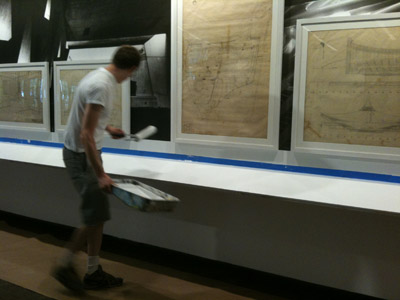 Here is Jeff, who illustrates children's books and who works for the GSD putting up exhibitions. He's putting up a show on the utopian aspects of Kenzo Tange which was organized by a GSD PhD student, Seng Kuan.
Here is Jeff, who illustrates children's books and who works for the GSD putting up exhibitions. He's putting up a show on the utopian aspects of Kenzo Tange which was organized by a GSD PhD student, Seng Kuan. Here's some work for the Chinatown Library project, which was a student initiative for which the GSD ponied up cash. http://www.gsd.harvard.edu/news/chinatown_library_project.html
 Here was one of our info sessions--this one was on Harvard's health services. We had these nifty little clickers with which we could give our responses to multiple-choice questions that she had for us. Our answers came up on the screen as a graph and, besides being nifty, this is probably a good source of statistics on incoming international students for the health services people.
Here was one of our info sessions--this one was on Harvard's health services. We had these nifty little clickers with which we could give our responses to multiple-choice questions that she had for us. Our answers came up on the screen as a graph and, besides being nifty, this is probably a good source of statistics on incoming international students for the health services people.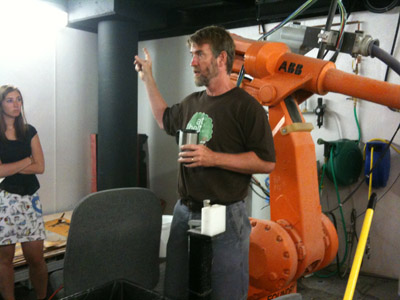 Stephen Hickey is showing us the very scary and impressive water jet robot.
Stephen Hickey is showing us the very scary and impressive water jet robot.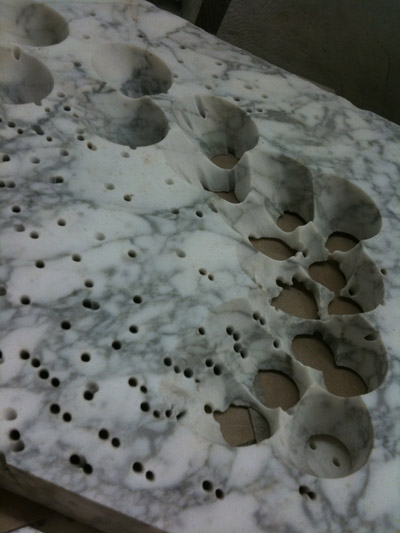 If you're wondering why I think a little squirting water is so scary, this is what it does to marble.
If you're wondering why I think a little squirting water is so scary, this is what it does to marble. The water-jet robot and the giant tub of sludge that is used to dissipate the energy it produces.
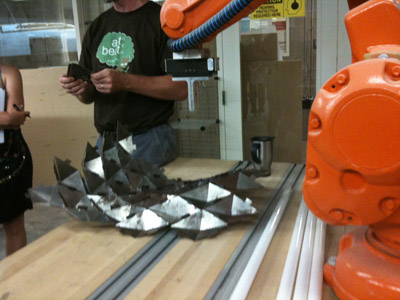 A smaller and cuter version of this robot, with a metal-folding project some students completed with it.
A smaller and cuter version of this robot, with a metal-folding project some students completed with it. The GSD doesn't want us to lose fingers, so the table saw has a nifty sensor which can detect the greater electrical conductivity of human flesh, which causes the blade to immediately retract. This makes me happy.
The GSD doesn't want us to lose fingers, so the table saw has a nifty sensor which can detect the greater electrical conductivity of human flesh, which causes the blade to immediately retract. This makes me happy. The Materials Collection has all kinds of cool stuff, including LiTraCon, which is a brand of concrete that uses fiber optics to allow it to transmit light.
The Materials Collection has all kinds of cool stuff, including LiTraCon, which is a brand of concrete that uses fiber optics to allow it to transmit light.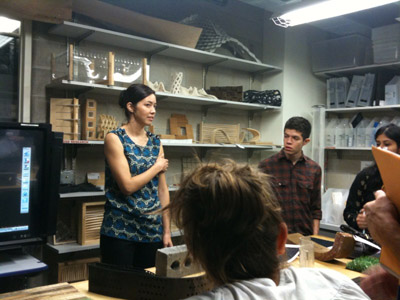 In the Materials Collection.
In the Materials Collection.
Thank you for reading!
Lian
This blog was most active from 2009-2013. Writing about my experiences and life at Harvard GSD started out as a way for me to process my experiences as an M.Arch.I student, and evolved into a record of the intellectual and cultural life of the Cambridge architecture (and to a lesser extent, design/technology) community, through live-blogs. These days, I work as a data storyteller (and blogger at Littldata.com) in San Francisco, and still post here once in a while.



2 Comments
Lian,
First and foremost a heartfelt congratulations on the completion of your thesis. Although I have been removed from Academia for a while I thoroughly understand the satisfaction of a difficult job complete and a job well done.
When I first started contemplating a career change to architecture a little more than a year ago I first heard the phrase "Unapologetically Architecture-Centric" bantered about. It is a phrase to which an increasing contemplation has brought increasing umbrage; so much so that I now subject you to some of my peculiar musings.
My short question is: Given the holistic nature of the discipline, how can any program claim to be Architecture-centric? The phrase seems to imply that the predicate of architecture can exist by degrees. Certainly programs do vary in their concentrations be they design, theory, practice, or what have you, but architecture itself - as a sum greater than the total of these constituents - can not be any more or less pursued based upon that concentration.
Alternately: How can a self-proclaimed architecture program fail to be architecture-centric? The tautology overwhelms me. Further, what form would an APOLOGETICALLY architecture-centric program take? Isn't that called Engineering? To utter the term architecture is to grasp its inherent consequence.
At best I can see the phrase as a recognition affirming the autonomy and authority of Architecture as a discipline and embracing the enormity of its unabashed study. This could be much more simply communicated by claiming the program was "unapologetically thorough", "unapologetically architecture-centric" seems to imply a unique, almost titular, claim to the understanding of the discipline exclusive to that specific program - a claim dripping with hubris.
In any case just some random thoughts. As a philosophy major in a previous life I will no doubt struggle to learn a new language in architecture. As such I'd love to discuss the employment of other technical terms at your leisure - by which I am sure to mean next July! (Such as symbollic metaphysics) Similarly, I would consider any form that is computationally or biologically derived to be, by process, devoid of ornamentation until otherwise altered. I have so much to learn.
Anyway, thanks for all your time. Your posts remain remarkably lucid and entertaining and I can only hope the semester doesn't beat too terrible much of the spirit out of you.
Cheers,
Skip
Hi Skip! Thanks so much for your letter and all your thoughts. I know it's strange to cut disciplinary boundaries any one way and not another, but having started the program here now, I can see what Scott Cohen may have been talking about. Our first two projects were both buildings (although in a conceptual and schematic, rather than really programmatic, structural, or site-specific manner) and the majority of our readings and subjects (say, in our drawing class) are from within what we'd generally recognize as architectural discourse. We're not reading literature, drawing from life, or scripting abstract forms (at least, not yet).
Block this user
Are you sure you want to block this user and hide all related comments throughout the site?
Archinect
This is your first comment on Archinect. Your comment will be visible once approved.